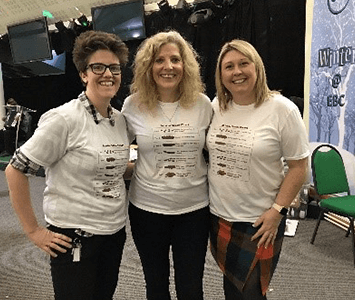“May I have my poo back please?”
Not a sentence I recall having said before.
But then again, I’ve never before dressed up in a poo costume in front of 90 people we support & their families, blown up inflatable poo hats, cut cake adorned with poo table toppers or played ‘hook a poo.’ For the record, the poo that I wanted back was a stress-relieving squidgy soft toy, probably type 4 on the Bristol stool chart according to the pictures on the T-shirts proudly worn by my colleagues…
The event was my area’s ‘Everybody Counts’ forum. With input from families, we chose to devote the afternoon to talking about constipation. It’s obviously a personal topic. Right on cue ‘Jenni,’ a person we support, put her hand up to say “Isn’t this a bit private – I don’t think we should be talking about it.”
We must talk about it. After all, about half of all people with a learning disability and autism suffer from long term constipation, leading to a range of direct and indirect health impacts. Put bluntly, if you’re constipated it’s pretty hard to enjoy life. But without the right management, constipation can cause serious injury or kill.
I should know. My learning disabled brother was constipated for a fortnight over Christmas. It was the devil’s own job to get his GP to take it seriously. Yes, I turned into a sister from hell in demanding the right support for him. Yes, I would do it again. Yes, I expect our support teams to be similarly determined on behalf of the people they support. Faecal impaction is not funny.
The poo props were our way of overcoming embarrassment like Jenni’s, and they worked a treat. People with higher level needs are likely to have bowel management and monitoring plans in place already, but more independent people with capacity to make their own decisions – who understandably don’t want to talk about their poo – are at greater risk.
Our ‘Everybody Counts’ day was specifically designed to help people like this talk about their bowel, often for the first time, and it was a great success. ‘Harry,’ for example, approached his support team to say that he thinks he’s been constipated for years but was always too embarrassed to talk about it. He now has a doctor’s appointment.
Constipation is a Dimensions ‘Never Event’ – that’s a concept we pinched from the NHS describing something measurable that can result in serious injury or death, which can usually be avoided if everybody acts appropriately and follows established procedures. We only have 7 ‘Never Events’ – the constipation one reads as follows:
“No-one should suffer any harm as a result of a failure to administer or monitor the medication prescribed, or to follow established processes, for the relief or avoidance of constipation.”
By setting the bar at “any harm” we ensure national scrutiny of incidents that might otherwise be resolved at local level. That helps the organisation to learn, and to do things better. Our area’s Everybody Counts meeting concluded with reminders to colleagues about the various processes and documents in place to help them support people to have better bowel health. A serious message in a fun wrapper. Regrettably, photographic evidence is available…
